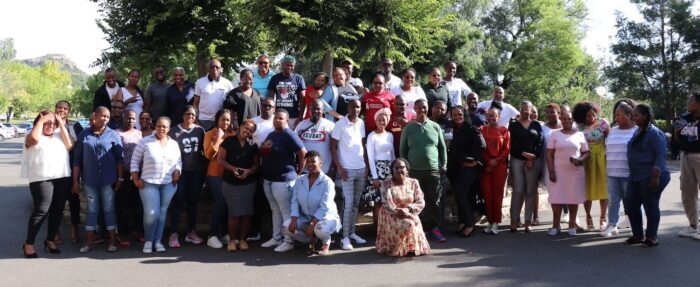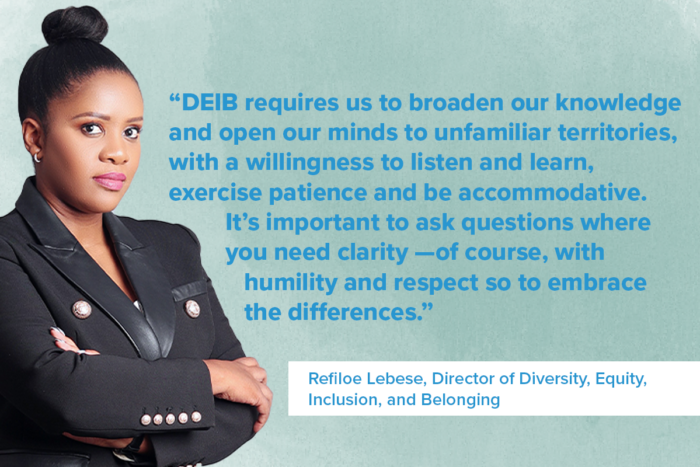This is part two of a conversation with Refiloe Lebese, the director of Diversity, Equity, Inclusion, and Belonging (DEIB) at the Elizabeth Glaser Pediatric AIDS Foundation (EGPAF). As a human resources professional with more than 20 years of experience, Refiloe has focused on nurturing a workspace in which all employees feel valued as they are.
Refiloe, can you explain what DEIB looks like for an international organization like EGPAF that has many cultural contexts?
DEIB means different things to different countries. It is important to recognize this and, therefore, we do not have a one-size-fits-all approach.
I remember when the focused DEIB effort at EGPAF started in 2020. I was still in the human resources department at the time. My HR counterparts in African countries would say, “This is not our issue, it’s an American issue”—because they were basically aligning it to the George Floyd murder in the United States.
But people around the world have now woken up to the realities of their own issues. DEIB work extends way, way above issues of race. We’ve got our own huge share of issues in Africa, whether we were aware of it or not, issues of ethnicity, issues of tribalism, issues of gender.
DEIB requires us to broaden our knowledge and open our minds to unfamiliar territories, with a willingness to listen and learn, exercise patience and be accommodative. It’s important to ask questions where you need clarity —of course, with humility and respect so to embrace the differences.
I am in a unique position because I’m based in South Africa, so I have had a lens on many issues. One of the biggest challenges that Africa has, actually, would be accepting and embracing the LGBTQ+ community. It can be something that is so taboo that people are sometimes uncomfortable of even sitting down and talking on this topic. Issues of culture and religion then come into play.
Culture and religion are deeply rooted in Africa. And it is important to be respectful of those traditions while we also prioritize the dignity of every person.
We want to challenge stereotypes. It’s easy to think, “I do not have any issue; others are the ones with issues.” But the more awareness we build around the DEIB, the more people are opening up. They’re like, “Wow, I really did not realize that this is how I do things and make others feel.”

The bulk of international HIV funding continues to come from the United States. Given this reality, how does an international NGO address decolonization?
The complexities are absolutely there, but the good thing is we have started. There is already a buzz around decolonizing aid. Organizations are asking themselves critical questions around this. EGPAF is also engaging internally to understand what this means to us as an organization. How do we ensure that we are addressing issues of power and privilege in the context of structural, systematic and social injustices? We certainly do not have all of the answers yet. But this is the right conversation.
We already have a wealth of experience in the countries where we work. EGPAF has the distinction of local leadership and local teams positioned to lead and implement our work. They are already the ones that are ensuring that things are happening on the ground in terms of implementation and strategy and the relationships on the ground, so we start with strong, local expertise.
We are reinventing and reimagining ourselves in the ways that we work with ministries of health. I totally believe we have to empower organizations in the countries that we work in and make sure that they’re able to sustain and rely on themselves. Yes, we are there to assist, but I think we would have done a great job when we know that local organizations are able to continue with the work that we’ve done.

With this DEIB work, it seems to me that it’s not the kind of challenge where you ever say that “We have crossed the finish line … let’s collect our prize.”
Absolutely. We say that DEIB is a living being, it continues to transform and change, and it means different things to different people. Remember, in the workplace right now we’ve five generations—our thinking is different across those generations, and our experiences are different. So really the notion of DEIB continues to evolve as we evolve. There can never be a finish line. Self-awareness continues to be a key driver.
DEIB is not going to be overnight success. Certainly, there are low hanging fruits. For instance, the recruitment piece— ensuring that we have diverse teams. That’s sometimes a bit easier to manage. But then there’s the process of changing mindsets on certain things, which may take more time. We are a unique organization where we’ve got such vast differences, so there are areas that are going to take us a while to really figure out.
This is where our country teams are really trying to get their heads around DEIB: How are we making sure that within the organization itself we are embracing, we are self-aware, and we are having these conversations. There are intricacies that we have to think of to help people to come along on this journey.




